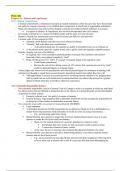Class notes
Chapter 18 - Ethical and Legal Issues
- Course
- PSYC 300A
- Institution
- University Of British Columbia (UBC )
Explore the lecture notes on Ethical and Legal Issues in psychology. Gain insights into the complex ethical dilemmas and legal considerations that arise in the field. Delve into ethical principles, codes of conduct, and professional guidelines that govern psychologists' practices. Examine legal fra...
[Show more]



